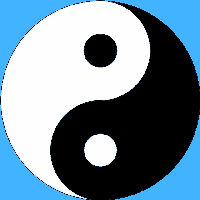Tai Chi as a Spiritual Practice (Way of Zen or Tao).
People often have very different ideas on what 'a spiritual practice' means, and usually its best to get on with whatever you do and don't talk to much.
Please take my ideas here as an inspiration only and form your own views on this matter.
A Relative Definition of 'Spiritual Practice'.
Anything that helps an individual to be happier, more comfortable within themselves, both physically and mentally and to be able to relate better to their environment and other people and so contribute more creatively in the World.
In short to be a happier, healthier and wiser person and the practice of Tai Chi can certainly achieve all of the above.
An Absolute Definition of 'Spiritual Practice' - more difficult to discuss.
I'll offer my personal view here, for what it's worth. This view is still developing...
There always seems to be more than one way of going about things in life.
The Yogic Path - Fire Path
The first path follows in a way that seems similiar to the Indian Yogic System.
The human body-mind combination at its fundamental, comprises a serious of energy centres of 'chakras' on different frequency levels which act as a template for the 'substance' of the body and mind.
The body-mind 'develops' by cleaning the chakras, developing greater sensitivity and increasing the energy of them.
As higher chakras develop this allows for different relationships between you and the 'physical world around' and generally there is a greater sense of knowing and peace.
And then at some stage, beyond your control, the primal energy, Kundalini in Yogic terminology, opens up in the base of the spine and proceeds to rise up through the chakras like a roaring volcano of fire.
At this stage, the person can experience an alternative mind, a universal mind perhaps, or a fragment of one in resonance with the whole, and the ego mind is no longer the centre of the persons universe.
The Dan Tian / Hara Way - Water Path
This second path is my way of trying to understand the 'spirituality' that is in Taoism, Zen & for those who look closely in Tai Chi.
Practices which cultivate the Qi or Ki energy in the Dan Tian or Hara can provide the practitioner with access to the consciousness of the 'original mind' directly.
This for me is the difference between traditional Buddhism following a gradual path such as Therevada and Hui Neng, the 6th Zen Patriarch's instant path.
The traditional way cleans the mind-body and leaves the 'transition' till later perhaps like Yoga.
The Instant path, points directly at the original mind. But this also usually requires a high level of meditative experience and contact with one who already has an 'awake' body-mind and it still requires further cultivation afterwards, so the two can appear similiar.
Martial arts like Tai Chi, start off with a focus on developing the Qi of the Dan Tian or Hara and in the beginning this will develop mainly around the abdominal area.
This can give certain kinds of experience often including access to aspects of the 'original mind' and greater martial power, but this is not the end of the journey and can probably be over done. Balance is everything.
Gradually as the Qi is cultivated and refined by meditative practice, it expands out to encompass every level of the body-mind and perhaps beyond and so evolves into a higher spiritual journey.
This for me follows the path of Hui Neng and hence relies on contact with a qualified teacher to assist the 'transition' awakening the 'original mind'.
The cleaner the teacher's Qi the better, but I still believe any teacher with an 'awake' Dan Tian can assist this transition through resonance between the bodies while you practice together.
It is my understanding that Chen Tai Chi has taken the 'health' & 'power' aspects of Dan Tian cultivation from the Taoist Tradition, and this can lay the foundation for a strong practice, but I believe it needs to be combined with a meditation practice such as Zen, to complete the process of refining the Qi.
Shaolin Kungfu followed this tradition of martial cultivation and meditation combined and Chen Wang Ting, the creator of Chen is supposed to have spent the latter years of his life in meditation as a hermit.
Yang Tai Chi, evolved from Chen and works much more with meditation and the Shen (spirit) and so for me, this makes a more complete vehicle for following this path without perhaps requiring the assistance of 'sitting meditation'. I would include the small circle Wu style here as well.
I am also personally interested in combining Yang & Chen practice and the more subtle practice of Chen.
Intention is important in creating a path for oneself. If one focuses on martial aspects or egoic gratification, they will no doubt develop more rather than Shen and the spiritual aspects.
In traditional China, the practitioners of Tai Chi would have had access to Taoist philosophy and Confucius morality and I also see this as an important aspect of the foundations for a spiritual practice just as in Zen Buddhism. This has perhaps been neglected in the mainstream Tai Chi of China, in recent years.
The final process is the cultivation and refinement of your own Qi and I consider this the individual's responsibility, not the teachers.
Gradually your Tai Chi and your body-mind Qi will become pure like flowing water.
And this may take the rest of your life...
